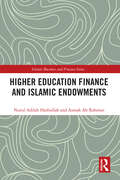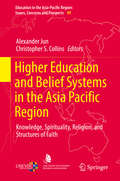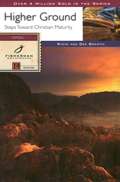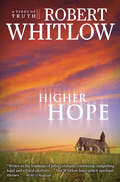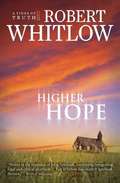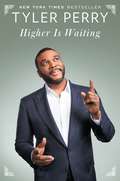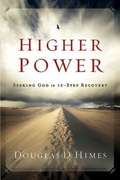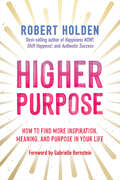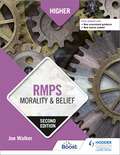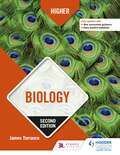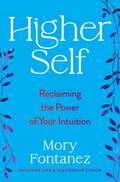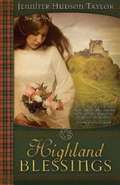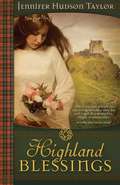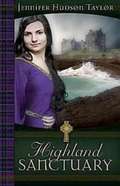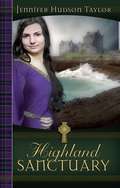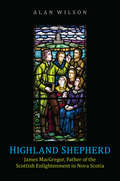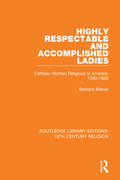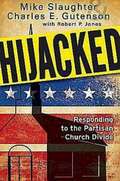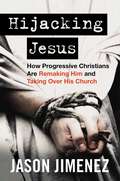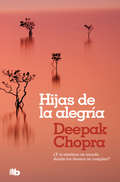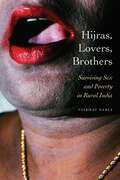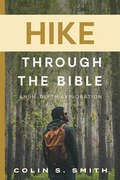- Table View
- List View
High-Vibe Crystal Healing: Crystal Frequencies and Body Layouts That Will Rock Your World!
by Jolie DeMarcoHarmonize your spiritual frequency and create more positive vibes using crystals and gemstones, magical boosters for the body and soulHigh-Vibe Crystal Healing is all about working with crystals for healing, fun, knowledge, and a higher frequency life. Within these pages, you'll find twenty-six epic crystal body layouts as well as information on sixty-six individual crystals and gemstones that will help you harmonize the energy field known as your aura. Additionally, you will learn to release negative baggage, improve your health, balance your energy, and connect to spirits and guides. Master crystal healer Jolie DeMarco is the perfect guide to finding which crystals and stones best align with your specific physical ailments, emotional blockages, and spiritual-elevation goals. She also includes tips and techniques for working with twenty-two essential oils to enhance your crystal sessions. Whether you're just beginning your crystal journey or are an expert crystal energy healer, this book includes the complete details and down-to-earth instructions you need to move forward on your spiritual path.Every day, more and more people around the world are experiencing the power of crystals for working through illness, developing a stronger sense of purpose, and even going out of body and visiting past or parallel lives. The inspiring layouts and stones in this book are a perfect way for you to explore the crystal vibrational energies that the universe has in store for you.Praise:"A fun, insightful and empowering book that will show you how to simply and successfully enhance your life and well-being with crystals and gemstones."—Jack Canfield, #1 New York Times bestselling author and cocreator of the Chicken Soup for the Soul series
Higher Education Finance and Islamic Endowments (Islamic Business and Finance Series)
by Nurul Adilah Hasbullah Asmak Ab RahmanPublic debt pressures due to the global economic crisis in several countries have impacted higher education, compelling governments to curtail the funding of higher education institutions (HEIs). Various instruments have been proposed as a platform for the private sector to channel funding to HEIs. This book introduces readers to the issues surrounding the financing of HEIs, especially public universities, which are dependent on government budgets. It discusses the sources of funding for HEIs, focusing on philanthropic instruments through endowment and waqf funds. Since both forms of income are obtained via contributions from third parties, such as alumni, individuals, business corporations etc., it is essential that they are managed in such a way to ensure their sustainability and that their benefits can be accessed without interruption. It explains the theory of successful endowment and waqf at HEIs, namely appropriate investment planning, superior investment committees, highly skilled investment managers, alumni networks, diversity of income sources and effective fundraising. These elements have been studied empirically in this book through case studies of several selected Malaysian public universities. The book considers policy implications and offers recommendations of strategies that Universities can adopt, such as the appointment of fund managers. No specific guidelines currently exist for appointing fund managers to enable universities to invest in assets such as bonds, equities, and property. Therefore, the book encourages universities to grow the endowment and waqf funds through proper investment strategies executed by professional fund managers. The book contributes new knowledge to scholars, students and researchers, as well as informing university administrators how to collect, manage and invest funds from endowment and waqf.
Higher Education and Belief Systems in the Asia Pacific Region: Knowledge, Spirituality, Religion, and Structures of Faith (Education in the Asia-Pacific Region: Issues, Concerns and Prospects #49)
by Christopher S. Collins Alexander JunThis book underscores the role of belief and knowledge that are outside the canons of science, as they are not often considered within the core functions of a university. It explores various ways in which belief systems are part of the fabric of higher education – either implicitly or explicitly – and pursues a deeper understanding of the role of belief practices as it plays out in both private and public higher education. The broad variety of geographic locations and belief systems represented here demonstrate the ways in which implicit and explicit belief systems affect higher education. The book is unique in its breadth of coverage, but also in its depth of exploration regarding how belief systems function in society through the avenue of higher education, which is often a central site for the production and dissemination of knowledge.
Higher Ground: Steps toward Christian Maturity
by Steve Brestin Dee BrestinThis study guide is designed to help you in your walk toward Christian maturity. If you are hungering and thristing, you are already on the threshold of higher ground.
Higher Hope
by Robert WhitlowThe Tides of Truth series follows one lawyer's passionate pursuit of truth--in matters of life and the law.Competition is tough at the Savannah law firm where Tami Taylor serves as a law clerk. But Tami's work sets her apart--and the firm's partners see something special in her. So they assign her to a libel case against an abrasive, outspoken preacher who is either a prophet or a lunatic.On the surface it appears to be an open and shut case; the preacher seems fully outside the bounds of law. And Tami's strict religious upbringing could be the firm's ace-in-the-hole. But as the investigation continues, Tami is troubled by the preacher's uncanny prophetic abilities. And their client seems to be hiding something.Tami returns to her hometown, struggling with several critical choices--as two very different men from the firm vie for her heart. Just when the challenges seem insurmountable, hope for Tami arrives from a surprising place. And it's a higher hope than she's ever imagined.
Higher Hope (Tides of Truth, Book #2)
by Robert WhitlowTami Taylor faces impossible challenges in life, law, and love--until she discovers a higher hope. A libel case will require some legal maneuvering and the summoning of a greater hope than Tami has ever known.
Higher Is Waiting
by Tyler PerryAn intimate book of inspiration by the one and only Tyler Perry—actor, producer, director, philanthropist, and the creator of Madea Higher Is Waiting is a spiritual guidebook, a collection of teachings culled from the experiences of a lifetime, meant to inspire readers to climb higher in their own lives and pull themselves up to a better, more fulfilling place. In this intimate book, Tyler Perry writes of how his faith has sustained him in hard times, centered him in good times, and enriched his life. Beginning with his earliest memories of growing up a shy boy in New Orleans, Perry recalls the moments of grace and beauty in a childhood marked by brutality, deprivation, and fear. With tenderness he sketches portraits of the people who sustained him and taught him indelible lessons about integrity, trust in God, and the power of forgiveness: his aunt Mae, who cared for her grandfather, who was born a slave, and sewed quilts that told a story of generations; Mr. Butler, a blind man of remarkable dignity and elegance, who sold penny candies on a street corner; and his beloved mother, Maxine, who endured abuse, financial hardship, and the daily injustices of growing up in the Jim Crow South yet whose fierce love for her son burned bright and never dimmed. Perry writes of how he nurtured his dreams and discovered solace in nature, and of his resolute determination to reach ever higher. Perry vividly and movingly describes his growing awareness of God’s presence in his life, how he learned to tune in to His voice, to persevere through hard times, and to choose faith over fear. Here he is: the devoted son, the loving father, the steadfast friend, the naturalist, the philanthropist, the creative spirit—a man whose life lessons and insights into scripture are a gift offered with generosity, humility, and love.
Higher Power: Seeking God in 12-Step Recovery
by Douglas D. HimesRecalling the Christian roots of Alcoholics Anonymous, Higher Power connects classic biblical teaching with contemporary 12-step practice. Each chapter draws inspiration from the Old and New Testaments and the Big Book of Alcoholics Anonymous. Higher Powered is an excellent resource for anyone in recover trying to work through each step, from admitting our brokenness to surrendering to God – and through God’s help becoming higher powered.
Higher Purpose: How to Find More Inspiration, Meaning, and Purpose in Your Life
by Robert HoldenWhy are you here? What is life for? What are you meant to do? Best-selling author Robert Holden helps you go from looking for your purpose to living it. (Hint: It&’s not just about you.)&“How do I find my life&’s purpose?&” In the 10-year run of Robert Holden&’s call-in radio show, Shift Happens!, his listeners asked that question more often than any other, by far. It seems everybody is looking for their purpose, and yet we all struggle to recognize it and live it. In Higher Purpose, Holden takes readers on an epic journey of self-discovery that includes the hero&’s journey with Joseph Campbell, Carl Jung&’s work on true vocation, Victor Frankl&’s search for meaning, a pilgrimage with St. Francis of Assisi, the poetry of Wordsworth and Rilke, and much more. The journey has four stages: &“The Call&” explores &“the calling&” inside you to live a more meaningful life. &“The Path&” helps you to realize what inspires you, what brings you alive, to follow your joy, and to do more of what you love.&“The Ordeal&” tackles the inner blocks, the road of trials, and challenges you must overcome to live your higher purpose. &“The Victory&” encourages you to not betray yourself, to &“sing your whole song,&” and to keep on saying YES to your soul&’s high adventure. In Higher Purpose, Holden explores three distinct levels of purpose: your unique purpose, a shared purpose, and the greater purpose of life. He offers inquiries, meditations, and journaling exercises to help you live your purpose every day. And he shares stories from his own life and conversations with a host of remarkable people—Maya Angelou, Louise Hay, Jean Houston, Matthew Fox, Robert Thurman, Caroline Myss, Andrew Harvey, Wayne Dyer, Oprah Winfrey, and more.
Higher RMPS: Morality & Belief, Second Edition
by Joe WalkerExam Board: SQALevel: HigherSubject: RMPSFirst Teaching: August 2018First Exam: June 2019The only resource for RMPS at Higher level, by a bestselling author and expert in the field. Completely updated with the latest SQA assessment changes.This book provides comprehensive coverage of the updated Higher in Religious, Moral and Philosophical Studies, but is also ideal for students across Scotland studying key topic areas in Morality and Belief as part of the broad general education and the senior phase of RME.- Written in a lively, accessible and engaging style that reflects real-life situations and moral issues- Highlights the importance of dealing with varieties of belief within religious traditions- Deals with up-to-date contemporary and topical issues in a highly practical manner
Higher RMPS: Morality & Belief, Second Edition
by Joe WalkerExam Board: SQALevel: HigherSubject: RMPSFirst Teaching: August 2018First Exam: June 2019The only resource for RMPS at Higher level, by a bestselling author and expert in the field. Completely updated with the latest SQA assessment changes.This book provides comprehensive coverage of the updated Higher in Religious, Moral and Philosophical Studies, but is also ideal for students across Scotland studying key topic areas in Morality and Belief as part of the broad general education and the senior phase of RME.- Written in a lively, accessible and engaging style that reflects real-life situations and moral issues- Highlights the importance of dealing with varieties of belief within religious traditions- Deals with up-to-date contemporary and topical issues in a highly practical manner
Higher RMPS: Religious & Philosophical Questions, Second Edition
by Joe WalkerExam Board: SQALevel: HigherSubject: RMPSFirst Teaching: August 2018First Exam: June 2019The only resource for RMPS Religious and Philosophical Questions at Higher level, written by a bestselling author and expert in the field. Completely updated for the 2018 SQA specification.This book provides comprehensive coverage of the newly designed CFE Higher in Religious, Moral and Philosophical Studies. It is also ideal for students across Scotland studying key topic areas in Religious and Philosophical Questions as part of the broad general education and the senior phase of RME.- Offers a lively, accessible and engaging style with appropriate humour that reflects real-life situations and moral issues- Highlights the importance of dealing with varieties of belief within religious traditions- Deals with up-to-date contemporary and topical issues in a highly sensitive and informative manner
Higher RMPS: Religious & Philosophical Questions: Second Edition
by Joe WalkerExam Board: SQALevel: HigherSubject: RMPSFirst Teaching: August 2018First Exam: June 2019The only resource for RMPS Religious and Philosophical Questions at Higher level, written by a bestselling author and expert in the field. Completely updated for the 2018 SQA specification.This book provides comprehensive coverage of the newly designed CFE Higher in Religious, Moral and Philosophical Studies. It is also ideal for students across Scotland studying key topic areas in Religious and Philosophical Questions as part of the broad general education and the senior phase of RME.
Higher Self: Reclaiming the Power of Your Intuition
by Mory FontanezIntuitive Life and Leadership Coach Mory Fontanez offers a transformative vision: when we align with our intuition, we unlock not only personal fulfillment but also the power to create meaningful impact in the world. By attuning to this profound inner wisdom, we are free to live authentically, unapologetically, and in alignment with our true purpose.Yet, for many of us, the connection to our intuition has been severed. Overwhelmed by societal expectations and external pressures, we’ve lost touch with our Higher Self—the source of infinite potential, love, and wisdom that resides within us.As an expert crisis manager, Mory Fontanez has guided Fortune 500 leaders and public figures through high-stakes crises, including public scandals and major organizational change. Her work with executives, celebrities, and teams has shown how intuitive decision-making is essential for navigating chaos, rebuilding trust, and leading with clarity. Higher Self teaches readers how to tap into this same inner wisdom, breaking free from reactivity and fear to make grounded, authentic choices, even in the most turbulent times.In a world increasingly defined by division, the need to reconnect with this inner guide has never been greater. Higher Self offers a compelling pathway back to our intuitive essence. Drawing from years of experience coaching influential leaders and from her own personal journey, Mory demystifies intuition, breaking it down into accessible, actionable steps. Through powerful client stories, thought-provoking insights, and practical guidance, she leads readers on a journey of self-discovery and healing, empowering them to trust and nurture their Higher Self.Mory’s work reveals a profound truth: when we reconnect with the highest version of ourselves, we begin to heal the wounds of shame and rejection, transcend limiting beliefs, and thrive in ways we never imagined. This voice within—the one guiding us with clarity and certainty—holds the key to living in alignment with our own highest good and the greater good of others. Higher Self is not just a book; it is a call to reclaim the wisdom, power, and purpose that have always been yours.
Highland Blessings
by Jennifer Hudson Taylor2011 Holt Medallion Award Winner - Best First NovelHighland Blessings is the story of a highland warrior who kidnaps the daughter of his greatest enemy and clan chief to honor a promise he made to his dying father. Bryce MacPhearson, a highland warrior, kidnaps Akira MacKenzie on her wedding day to honor a promise he made to his dying father. While Akira's strength in the Lord becomes a witness to Bryce, she struggles to overcome her anger and resentment when he forces her to wed him, hoping to end a half-century-old feud between their clans.While Akira begins to forgive, and Bryce learns to trust, a series of murders leaves a trail of unanswered questions, confusion, and a legacy of hate that once again rises between their families. Clearly, a traitor is in their midst. Now the one man Akira loves no longer trusts her, and her own life is in danger. Can Bryce look beyond his pain and seek the truth? Will Akira discover the threat against her before it's too late? How will God turn a simple promise into bountiful Highland blessings?
Highland Blessings
by Jennifer Hudson Taylor2011 Holt Medallion Award Winner - Best First Novel Highland Blessings is the story of a highland warrior who kidnaps the daughter of his greatest enemy and clan chief to honor a promise he made to his dying father. Bryce MacPhearson, a highland warrior, kidnaps Akira MacKenzie on her wedding day to honor a promise he made to his dying father. While Akira's strength in the Lord becomes a witness to Bryce, she struggles to overcome her anger and resentment when he forces her to wed him, hoping to end a half-century-old feud between their clans. While Akira begins to forgive, and Bryce learns to trust, a series of murders leaves a trail of unanswered questions, confusion, and a legacy of hate that once again rises between their families. Clearly, a traitor is in their midst. Now the one man Akira loves no longer trusts her, and her own life is in danger. Can Bryce look beyond his pain and seek the truth? Will Akira discover the threat against her before it's too late? How will God turn a simple promise into bountiful Highland blessings?
Highland Sanctuary
by Jennifer Hudson TaylorA Sanctuary of Secrets . . .Gavin MacKenzie, a chieftain heir who is hired to restore the ancient Castle of Braigh, discovers a hidden village of outcasts who have created their own private sanctuary from the world. Among them is Serena Boyd, a mysterious and comely lass, who captures Gavin's heart in spite of harboring a deadly past that could destroy her future.The villagers happen to be keeping an intriguing secret as well, and when a fierce enemy launches an attack against them, greed leads to bitter betrayal. Then, as Gavin prepares a defense, the villagers unite in a bold act of faith, showing how God's love is more powerful than any human force on earth."Travel back to medieval Scotland with this great inspirational tale of faith and compassion." - FreshFiction.com"Highland Sanctuary is a wonderful medieval tale fraught with rich, compelling drama, excellent characterization, a plot with depth, beautifully described backdrops, and satisfying romance. In other words, a page turner. (Not recommended if you don't want to miss a night of sleep!)" - Sharlene MacLaren, Retailers' Choice nominee, IRCA finalist and bestselling author of Daughters of Jacob Kane series and River of Hope series"Jennifer Hudson Taylor has penned a heart-warming medieval romance full of mystery and intrigue with Highland Sanctuary. This book grabbed my attention from page one and kept it as I prayed for Serena to recover from her mystery illness and find true acceptance and freedom." - Laura V. Hilton, author of Patchwork Dreams"Highland Sanctuary offers just that--a reading sanctuary set in medieval Scotland, full of mystique and romance. To use the author's own words, it's a book that will remind readers that while there is no Heaven on earth, God can guide us through our challenges. Well done, Jennifer Hudson Taylor!" --Maureen Lang, author of Whisper on the Wind and Springtime of the Spirit"Jennifer Hudson Taylor has written a moving story of sacrificial love and heartrending choices amidst the haunting beauty of the Scottish highland coast." Ruth Axtell Morren, author of Wild Rose and Winter Is Past"Jennnifer Hudson Taylor has written another wonderful Scottish medieval novel. In Highland Sanctuary, she masterfully created a setting and authentically portrayed the culture of the time period. And the characters leapt from the pages." - Lena Nelson Dooley, award-winning author of the McKenna's Daughters series and Love Finds You in Golden, New Mexico
Highland Sanctuary
by Jennifer Hudson TaylorGavin MacKenzie, a chieftain heir who is hired to restore the ancient Castle of Braigh, discovers a hidden village of outcasts who have created their own private sanctuary from the world. Among them is Serena Boyd, a mysterious and comely lass, who captures Gavin's heart in spite of harboring a deadly past that could destroy her future. The villagers happen to be keeping an intriguing secret as well, and when a fierce enemy launches an attack against them, greed leads to bitter betrayal. Then, as Gavin prepares a defense, the villagers unite in a bold act of faith, showing how God's love is more powerful than any human force on earth.
Highland Shepherd
by Alan WilsonIn 1786, the Reverend James MacGregor (1759-1830) was dispatched across the North Atlantic to establish a dissenting Presbyterian church in Pictou, Nova Scotia. The decision dismayed MacGregor, who had hoped for a post in the Scottish Highlands. Yet it led to a remarkable career in what was still the backwoods of colonial North America. Industrious and erudite, MacGregor established the progressive Pictou Academy, opposed slavery, and promoted scientific education, agriculture, and industry. Poet and translator, fluent in nine languages, he encouraged the preservation of the Gaelic language and promoted Scottish culture in Nova Scotia.Highland Shepherd finally bestows on MacGregor the recognition that he so richly deserves. Alan Wilson brings MacGregor and his surroundings to life, detailing his numerous achievements and establishing his importance to the social, religious, and intellectual history of the Maritimes.
Highly Respectable and Accomplished Ladies: Catholic Women Religious in America, 1790-1850 (Routledge Library Editions: 19th Century Religion #14)
by Barbara MisnerOriginally published in 1988. This study examines women religious in the American community in the first half of the nineteenth century. The primary aim of this research was to determine who the women were who entered eight religious communities, and whether there was any clear relationship between who they were and their choice of community. This title will be of interest to students of history and religious studies.
Hijacked: Responding to the Partisan Church Divide
by Mike Slaughter Charles E. Gutenson Robert P JonesThe last 30 years have seen the political discourse within our country grow more rancorous and increasingly uncivil. During the same period, there has been a growing tendency to conflate one's theological commitments with one's political ideology. As a consequence, partisan politics has infiltrated our churches and political commitments are creating unnecessary divisions. Perhaps of most concern, these trends generally tend to obscure the properly holistic nature of the Gospel of Christ and turn people off to Christianity altogether. Too often, it often seems politics trumps theology. Sadly, this leads to division, where decisions on church direction, and even the content of teaching, gets determined more based on partisan politics than on sound biblical and theological factors. Hijacked explores this phenomenon, offers analysis, and proposes a way forward.
Hijacking Jesus: How Progressive Christians Are Remaking Him and Taking Over His Church
by Jason JimenezProgressives have fabricated a new Jesus so different from the real Savior that their faith can hardly be called Christianity.Progressive Christian leaders have abandoned the resurrected Savior of historical Christianity, radically reinterpreting Him as a Jewish mystic or a man of God devoid of divine claims and miracles. In the postmodern era, "remaking Jesus" has become a deadly temptation. The &“modern Jesus&” of progressives—supposedly friendlier and more accepting than the Savior we know from the Gospels—is gaining popularity and acceptance among self-identified Christians. But they don&’t realize that progressive Christianity rejects the biblical revelation of Jesus Christ, the Word made flesh. Hijacking Jesus addresses perennial questions about the nature of Christ and his teaching, testing the historical and theological accuracy of progressive Christians. Their &“Jesus&” is simply no match for the reliability of the four Gospels, which are the most credible historical sources for Jesus&’s life, teachings, miracles, death, and resurrection. Christians can accept no substitute for the witness of the Gospels and the theological doctrines of the church that Jesus Christ is Lord and Savior.
Hijas de la alegría: ¿Y si existiera un mundo donde todos los deseos se cumplen?
by Deepak ChopraDeepak Chopra, autor de Almas gemelas, nos ofrece una nueva historia de amor y redención, mágica y mística. Jess Conover, un joven escritor de Boston que lleva una vida bastante normal, con su cuota habitual de felicidad y dolor, desde hace un tiempo se siente inquieto sin saber por qué. Un domingo por la mañana le llega un extraño mensaje: «El amor te ha encontrado. No se lo digas a nadie, simplemente ven.» Poco después se encuentra viajando hacia el norte, en medio de una tempestad de nieve, rumbo a una peculiar escuela que se oculta del mundo y que está dirigida por unas mujeres que se llaman a sí mismas las «hijas de la alegría». Allí se iniciará un extraordinario viaje espiritual hacia un mundo más allá de los sentidos...
Hijras, Lovers, Brothers: Surviving Sex and Poverty in Rural India (Thinking from Elsewhere)
by Vaibhav SariaWinner, 2023 Bernard S. Cohn Prize, Association for Asian StudiesWinner, 2021 Joseph W. Elder Prize in the Indian Social SciencesWinner, 2021 Ruth Benedict Prize, Association for Queer AnthropologyHonorable Mention, 2023 Anne Bolin & Gil Herdt Book Prize, Human Sexuality & Anthropology Interest GroupHijras, one of India’s third gendered or trans populations, have been an enduring presence in the South Asian imagination—in myth, in ritual, and in everyday life, often associated in stigmatized forms with begging and sex work. In more recent years hijras have seen a degree of political emergence as a moral presence in Indian electoral politics, and with heightened vulnerability within global health terms as a high-risk population caught within the AIDS epidemic. Hijras, Lovers, Brothers recounts two years living with a group of hijras in rural India. In this riveting ethnography, Vaibhav Saria reveals not just a group of stigmatized or marginalized others but a way of life composed of laughter, struggles, and desires that trouble how we read queerness, kinship, and the psyche.Against easy framings of hijras that render them marginalized, Saria shows how hijras makes the normative Indian family possible. The book also shows that particular practices of hijras, such as refusing to use condoms or comply with retroviral regimes, reflect not ignorance, irresponsibility, or illiteracy but rather a specific idiom of erotic asceticism arising in both Hindu and Islamic traditions. This idiom suffuses the densely intertwined registers of erotics, economics, and kinship that inform the everyday lives of hijras and offer a repertoire of self-fashioning beyond the secular horizons of public health or queer theory.Engrossingly written and full of keen insights, the book moves from the small pleasures of the everyday—laughter, flirting, teasing—to impossible longings, kinship, and economies of property and substance in order to give a fuller account of trans lives and of Indian society today.
Hike Through the Bible: An In-Depth Exploration
by Colin S SmithGear up for some trails that will change your life.If you&’ve ever been on a hike, then you&’ve experienced views that stir your soul. But hikes can also be fatiguing, slippery, and precarious. Hike Through the Bible is a 50-session journey that helps you navigate through difficult passages of Scripture and takes you down exciting new trails where you&’ll encounter the Lord in an up close and personal way.Serving as a trusted, pastoral guide, Colin Smith leads you on a rigorous path where you&’ll explore the depths of God&’s Word. Each section of the hike includes five questions for personal reflection or group discussion. You will scale mountainsides, sit by waterfalls, and see rocks and foliage that you&’ve never noticed. Like any great hike, studying Scripture can feel intimidating or like hard work. But the discoveries—and this is a promise—are worth every minute of it!

